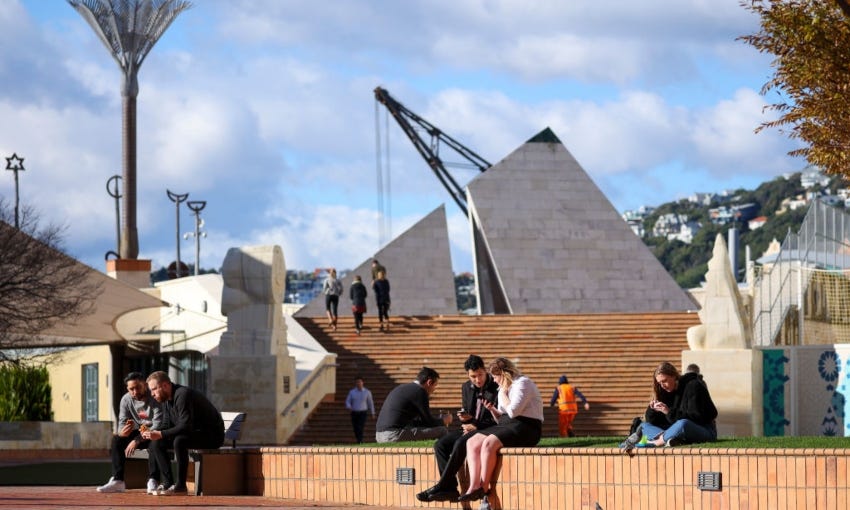NZ to halve emissions by 2030
The government has unveiled a new target on the eve of the climate conference to cut greenhouse gas emissions by 50%, but critics say it doesn’t go far enough
Mōrena and welcome to The Bulletin for Monday, November 1, by Justin Giovannetti. Presented in partnership with Z Energy.
In today’s edition: Cop26 climate conference starts; biggest days yet in the delta outbreak; Labour prepares for life after Jacinda Ardern; but first, NZ’s new emissions target.
PM Jacinda Ardern and climate change minister James Shaw. (Dom Thomas/RNZ)
We have eight years to halve our emissions. On the eve of the Cop26 climate conference, the government has set a target to cut greenhouse gas emissions to 50% of the country’s 2005 level by 2030. RNZ reports that it’s a substantial increase on the previous goal to slash emissions by 30%. According to the prime minister, the new goal means the country is now pulling its weight in the international effort to limit warming to 1.5 degrees celsius..
There will be a heavy cost to cutting emissions so quickly. Speaking with reporters yesterday afternoon, climate change minister James Shaw explained that the deeper target was a long time coming. As Shaw sees it, for nearly three decades the country has done too little, allowing emissions to keep rising and putting off difficult choices. After the delay, those choices are now more expensive and require sharper cuts than would have otherwise warranted.
To get to the country’s target by 2030, nearly two-thirds of the emissions reductions will need to come from overseas and could cost the country $1 billion annually until domestic cuts catch up. It’ll be cheaper to pay other people to reduce emissions than to do it in New Zealand. Stuff writes that along with the way the new target mixes gross and net reductions, something it calls an “accounting trick”, the international offsets are being used by other countries as well. To help get to the new target, the government will be subtracting the emissions reduced by the planting of new trees.
Shaw: After 30 years of delay, it’s the best we could do. This plan is a compromise, representing what Shaw called “the highest possible ambition in light of our national circumstances”. The Green co-leader and minister was clear yesterday that his hope would be to do more, but this is what he could get through a Labour cabinet. “I think we should be doing a whole lot more, especially given our rubbish record historically, but the alternative is committing to something we can’t deliver,” he said. “As long as I’m in this job, I’ll be striving to do more.”
The initial reaction hasn’t been glowing. The Council of Trade Unions called the new target a "welcome and positive step”. Environmental groups disagree. Greenpeace said the “government wimps out on climate action” and demanded a tougher target for agricultural emissions. Oxfam called the plan “a betrayal to Pacific Island countries”, while the WWF labelled it “a slap in the face”. The last two cited the government’s change in methodology as a problem. In a sign of the growing political division in parliament over the response to climate change, both Act and the National party attacked the government for setting a target they both called too high and too expensive.
The final word goes to Sam Dean, a climate scientist for NIWA who wrote this for the Science Media Centre:
“This is a bigger change in New Zealand’s international climate policy than may appear at first glance, and will help restore international credibility. What matters to global warming is the change in concentration of CO2 and other greenhouse gases in the atmosphere – the difference between what we emit and what we remove through actions like forestry, known as net-emissions. Reframing our targets this way is also simpler to understand.”
If you like what you’re reading, we need your support. The Spinoff is doing our utmost to keep you updated on Covid-19 related news. Every dollar our members contribute directly funds our editorial team and is devoted to ensuring we do more. Click here to learn how you can support the team today.
Failure at Cop26 could mean food shortages and mass migration. This is the decade the world needs to act on climate change and British prime minister Boris Johnson has warned that failure at the Glasgow climate summit could bring about an echo of the end of the Roman Empire, The Guardian reports. Johnson is pretty much warning that civilisation is in the balance and unlike Rome’s fall, this political, cultural and economic collapse would be global.
Dame Catherine Tizard has died. The country's first female governor-general and Auckland’s first female mayor, Tizard was 90 and died overnight after a long illness, according to RNZ. The prime minister, in a statement, described Tizard as a trailblazer for women in public life.
The Covid numbers: There are 56 cases in hospital and 2 in ICU/HDU. There are now 1,723 active cases in New Zealand. 135 new community cases were reported in Auckland yesterday, 6 in Waikato and 2 in Northland. 42,617 people were vaccinated on Saturday.
The Spinoff’s Covid data tracker has the latest figures.
The two biggest daily case counts yet in the delta outbreak were this weekend. The Covid outbreak seemed to be slowing last week, as case counts dropped into the double digits and the stress on hospital wards lessened. As The Spinoff’s live updates reports, the good news ended on Saturday with a record 160 cases, followed by 143 more on Sunday. Tonga’s first ever case was traced to Christchurch, while an Auckland care home has seen an outbreak. Despite the record-breaking tally and worrying trends, the government didn’t schedule a press conference over the weekend. On a positive note, 75% of eligible New Zealanders are now fully vaccinated.
Mickey Mouse is a winner in the free trade deal with the UK. When the trade agreement was unveiled two weeks ago, the NZ Herald (paywalled) trumpeted “there are no losers”. As Newsroom reports, all New Zealanders are going to end up paying a lot more for something in the trade deal that has nothing to do with the UK: extended copyright. Under the terms of the agreement, all intellectual property will be protected for 70 years after the death of its author, two decades longer than today. After decades of research, Newsroom says it’s a bad and expensive policy and the government knows it.
Are you a keen consumer of local business journalism? We're looking to find out a bit more about The Spinoff's business audience, so if you've got five minutes to spare this morning we'd love for you to take a quick survey.
Labour prepares for life after Jacinda Ardern. There’s a debate in Wellington circles, not a very serious one, about whether the prime minister will stay on after the next election. It’s been a heavy premiership so far. While Ardern is focused on running a majority government through a pandemic (and a long list of other things), Labour is making changes to how it will elect its next leader. As Andrea Vance writes in Stuff, the party is giving caucus more power to elect her successor. The goal is to create a smoother succession when the prime minister chooses to eventually step aside.
The first Māori language road signs are coming. Te Ao Māori News reports that Waka Kotahi, the NZ transport agency, has approved “Taihoa” (wait) and “Haere” (go) signs. Work crews in the Bay of Plenty will use the signs to manage traffic around sites, they are also colour-coded and come with helpful hand symbols.
Got some feedback about The Bulletin, or anything in the news?
Get in touch with me at thebulletin@thespinoff.co.nz
Civic square in Wellington (Hagen Hopkins/Getty Images)
Right now on The Spinoff: Tamatha Paul & Thomas Nash write ahead of today’s decision on Wellington’s transit future that the city needs to take brave steps. Reweti Kohere reports on why a man dressed as a cow was arrested outside of Fonterra HQ. Catherine Woulfe speaks with author Ashia Ismail-Singer about the difficulty getting a cookbook out. George Laking shares an open letter written to the prime minister on the importance of a bigger climate commitment. The Sunday essay from Dougal Rillstone on walking in isolation
For a longer read today, what would a new supermarket chain mean for New Zealand? As Stuff explains, Australia’s supermarket sector was once similar to the one in New Zealand, with two big players bringing in outsized profits. Then Aldi moved in. The German discounter is likely to have driven down prices and made the two big players in the Australian market more competitive and innovative. With an ongoing inquiry into high grocery prices, expect to hear louder calls for creating a third supermarket operator in New Zealand.
The All Blacks win in Wales was ruthless and breathtaking. RNZ writes that the win on the weekend may have shown the All Blacks at the best we can expect them. The match wasn’t a one-sided thrashing like that against the Americans a week earlier, but it was creative and the best rugby the Northern tour might produce.
That's it for The Bulletin. If you want to support the work we do at The Spinoff, please check out our membership programme.







